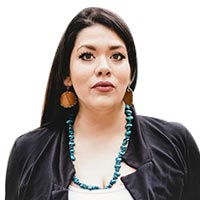
Rylie ‘Coyote’ Marchand, member of the Okanagan Indian Band outside of Vernon, B.C. fighting a title-winning battle, contributing to her 3-0 winning streak. Submitted by Rylie Marchand
Rylie ‘Coyote’ Marchand is a force to be reckoned with. The 18-year-old from the Okanagan Nation is a mixed martial arts (MMA) fighter and the reigning female Canadian MMA amateur champion.
She won the title in April of 2019, when she was 17, making her the youngest woman in Canada to hold that title. Marchand got into MMA when she was just eight years old.
“I used to do ballet, and field hockey, but my brother won a pass to try out boxing and MMA and I went with him,” she says.
“I fell in love… and now [being in the ring] is where I feel the most comfortable.”
Over the past 10 years, Marchand estimates she has competed in 35 to 40 tournaments and fought in three amateur matches. She’s dedicated herself to MMA, even moving countries to make her dream of becoming a professional MMA fighter a reality.
In September, Marchand moved to Albuquerque, New Mexico, where she says, she could broaden her experience and have more people to practice with. Right now, she’s working in Albuquerque as a childcare worker and waiting out the COVID-19 pandemic.
Marchand hopes when things settle down that she can return to Canada to fight in Vernon, B.C., her hometown.
“My biggest dream would be to fight in front of my hometown,” she says.
“Hometown fights is every fighter’s ultimate dream. All your own people there to cheer you on,” she says.
I caught up with Rylie ‘Coyote’ Marchand to ask her about how she’s doing, what is motivating her right now and what’s next. The conversation has been edited for length and clarity.
Kelsie Kilawna: How are you doing?
Rylie Marchand: It has been rough to be honest, but I’ve been staying busy with work and keeping healthy. It’s been difficult to train on my own just because everything is so uncertain, I don’t know when I’ll be able to fight again.
K: So, what does training like for you right now?
R: The gyms are closed so there aren’t any classes going on that I can attend. It’s also hard to keep motivated when the end of the COVID is so unclear. I don’t know when I’ll be able to train consistently again or when I will be able to compete. It is frustrating to have moved 1500 miles away from home to train and then not be able to — especially when I got a good taste for it before gyms closed. The gym in itself has been amazing, the coaches, training partners and atmosphere.
K: What are you doing to stay positive?
R: I’m staying positive by knowing that this whole situation is out of my hands. All I can do is use this time to rest and heal my body, as well as advance in other areas of my life.
K: What is it that you like most about MMA?
R: It’s where I’m most calm, where I feel at home. There is no place in the world more comfortable to me than in the ring. I’m in a whole other state when I’m fighting.
K: MMA is a male dominated sport, what’s it been like for you as a woman?
R: I’ve never been treated with anything other than the utmost respect from all my peers and supporters.
K: Hopefully you’ll be back fighting soon. How do you prepare for a fight?
R: Fight camps usually start about eight-weeks out from fight day. During your camp, you get a lot of extra support from coaches and training partners, everyone kind of gears sessions around you and what you need. Conditioning and stamina are also a focus. Then there is always the weight aspect, I walk around 10-15 pounds heavier than I fight so I will have to start managing and working my way down to fight weight.
K: What’s next for you right now?
R: My sights are set for fighting in Vernon, B.C. once this is all over. Not only will it be a dream to fight there but a reunion of sorts of when I’ll be able to come home when the borders are open.
Kelsie Kilawna is reporting from the Okanagan for The Discourse as part of the Local Journalism Initiative. She’s a Sqilxw (Syilx/Indigenous) journalist and photographer who was born and raised in Inkumupulux (the head of Okanagan Lake). Her work is featured on IndigiNews.com, a new platform created by The Discourse and APTN.










